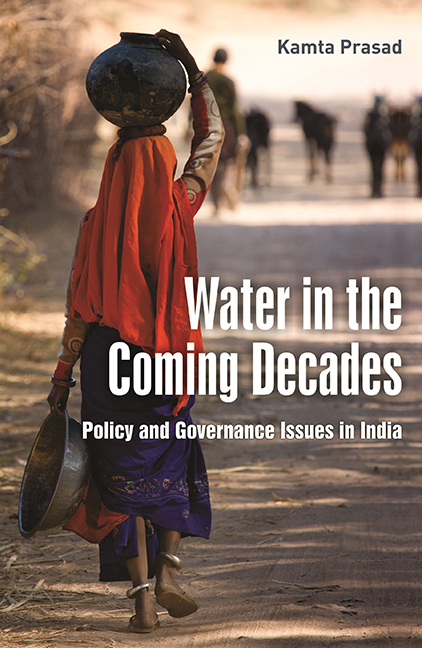Book contents
- Frontmatter
- Dedication
- Contents
- List of Tables
- List of Abbreviations
- Preface
- Acknowledgements
- Section I Overall Perspectives
- Section II Situational Analysis
- Section III Socio-economic, Institutional and Environmental Aspects
- Section IV Technological Options
- Section V Concluding Observations
- References
- Index
20 - Reforming the Legal Framework
Published online by Cambridge University Press: 13 July 2022
- Frontmatter
- Dedication
- Contents
- List of Tables
- List of Abbreviations
- Preface
- Acknowledgements
- Section I Overall Perspectives
- Section II Situational Analysis
- Section III Socio-economic, Institutional and Environmental Aspects
- Section IV Technological Options
- Section V Concluding Observations
- References
- Index
Summary
As water resource scenario is changing rapidly, water laws enacted in India decades ago for management of water resources need a review. This is provided here along with suggestions for improvement with respect to canal irrigation, flood management, inter-state issues, drinking water, decentralization and environmental aspects. A brief analysis of constitutional provisions related to water resources is provided at the outset. Legal aspects related to Participatory Irrigation Management (PIM) and groundwater are discussed in Chapters 10 and 19, respectively.
Introduction
The changing water resource scenario explained in earlier chapters is posing new challenges. Several aspects are involved, of which the legal ones are quite crucial since they provide the basic framework for governance. Many of the recent controversies surrounding the management and development of water resources in India veer around legal issues. Questions related to water rights, delegation of authority, hitherto followed command and control system, interstate water disputes, role of associations, legal control over groundwater, etc. are being raised more frequently. Some of the crucial laws framed decades ago have become either redundant or less useful for dealing with the present-day water resource scenario. A critical look, therefore, is necessary to chart out future course of action. Since laws work within the overall framework of the Constitution, an analysis of the Constitutional provisions with respect to water resources is also necessary.
Allocation of powers and responsibilities related to water among the Centre, the states and down below
In the Indian Constitution, water is a matter included in Entry 17 of List II, i.e. the State List. This entry is subject to the provision of Entry 56 of List I, i.e. the Union List. Both the entries are reproduced below for ready reference:
Entry 17 under List II of the Seventh Schedule: ‘Water, that is to say, water supplies, irrigation and canals, drainage and embankments, water storage and water power subject to the provisions of Entry 56 of List I’.
Entry 56 of List I of the Seventh Schedule: ‘Regulation and development of inter-state rivers and river valleys to the extent to which such regulation and development under the control of the Union is declared by the Parliament by law to be expedient in the public interest’.
- Type
- Chapter
- Information
- Publisher: Foundation BooksPrint publication year: 2014



